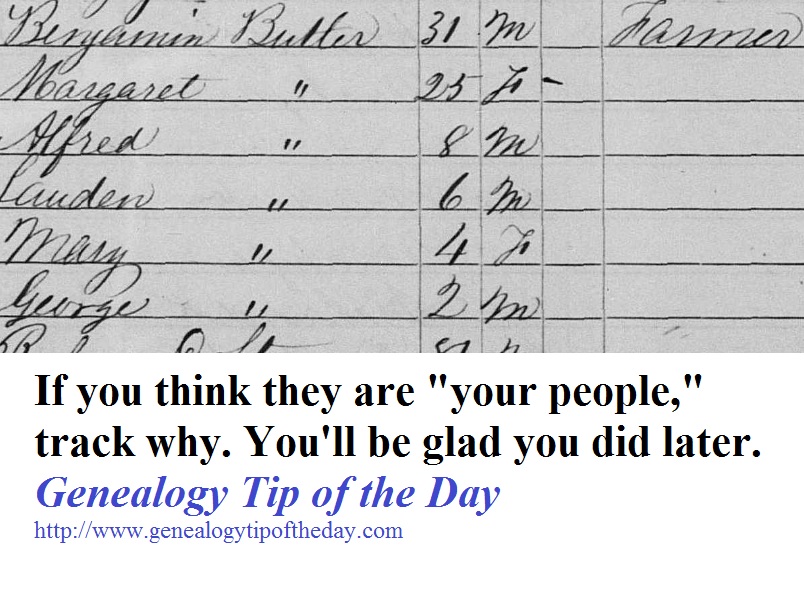It is important somewhere to keep track of your research logic as you progress. Otherwise you might not remember “why” you are researching a certain person.
While on a recent research trip, I focused on a certain Benjamin Butler in the 1850 census as being “mine.” Using that enumeration as the starting point, I searched other records and made research progress. A stack of papers, a file full of digital images, and records located were the end result. One problem–I didn’t track WHY I thought this 1850 census entry was for the correct person. It took me hours to reconstruct my reason. That was time wasted.
When I decided the 1850 guy was “mine,” I should have written down my reasons. They were valid reasons. Resurrecting them took time–time that could have been spent in a better way.








15 Responses
Just started doing that & adding check other reasons why. Question referring to something else. Where did the word of the day go to? I haven’t seen it 4 a while & miss it and comments from others. Thank u 4 any help in this mystery.
Thanks for your note. If you’re about the letters that get posted to our page on Facebook, they are still there. Facebook must not be showing them to you in your feed. Make certain you have your Facebook notifications set to get our posts.
These are helpful hints.
I have learnt through similarly wasted time and created a document which I call Links. It contains 4 sections, one for each of my main branches (each parent of my parents). Whenever I find a new name which “belongs”, I add it to the relevant main branch. I then create a “trail” showing how that person is connected to the branch. It’s not much work if you do it when the data is still fresh in your mind!!!!
That’s the time to do it. It also helps me to clarify my thought process and make certain I didn’t do something silly either 😉
Thank you. I will be doing this. Great hint.
While searching i will put a find into my Shoebox for further research later, after 40 pgs i decided to go through them to clear out my Shoebox, needless to say, i have spent quite some time trying to figure out.. Why did i save this one… very time consuming…
I now print out the record and write a note to myself on it.. so that if i find they are related, the info is on hand…
Good idea. Sometimes I take pictures of those notes as well.
This is great advice, and it’s something I’ve learned the hard way, unfortunately. I love the idea of a “link” worksheet.
When I started I was gun ho. I had all four grandparents and families put on at at one time as I found someone. So I was going back and forth to make sure they were on the correct family line. Now I have to back search each family line at a time. Any help how I can do it and not get discouraged. Thank you for any hope.
I found a Samuel Agnew (b. Ca. 1790) in Bradford Co., PA who died in 1854 very near my Irish Agnews who arrived in 1853. I kept him, thinking he might be a relative. I then found his widow, Sally, living with my great-grandfather’s brother William Agnew, Jr. on the 1860 Federal Census. Now I know they knew each other. Not sure of the exact relation yet.
Don’t do research if your tired. I have pictures down loaded for people I have no idea how or what side of the family they go to. Researched most of one Saturday (tired), rechecked it Sunday and had gotten a guy mixed in with the same info but wrong race & time frame. Was aggravated to say the least!
That’s a good point. Sometimes though, I really don’t know if that person in the census (or any record I happen to be viewing) is “mine”. I often find all of those additional records in order to determine if the person is mine. If I am lucky I will be able to tie those records together and match them to the person I am researching. Sometimes, after gathering several records, bios, etc., I still cannot determine if they belong to the person I am researching so I just file them and hope for an ID later.
I, too, connect records to ancestors with common names, find some fascinating tidbit on another family member, spend a little time with that, and when I come back to the person I started with, what seemed so obvious before is now a bit of a mystery to me. Hours wasted. Especially with Southern research. So many cousins marrying, so many contemporaries with the same name. It’s easy to confuse whose records are whose. For instance, I have two Nancy Tidmores, contemporaries born in 1820’s in DeKalb, Alabama. One is married to a grandfather. The other is married to an uncle who shares his name with at least four others. To top it off, they seem to be buried in the same cemetery.
A good research record certainly saves a lot of time.
Thanks for your article.
You are welcome. This problem can happen anywhere, but in some places it certainly seems worse.